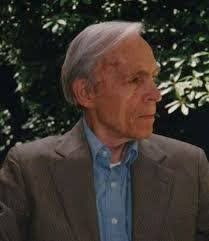
https://archetypeinaction.com/index.php/en/more-tools-to-change-society/222-jungian-topics/references-to-edward-edinger/4671-edward-edinger-individuation-a-myth-for-modern-man
https://www.youtube.com/watch?v=kAlCeJ4LuRk
Deepl翻訳
1,
エドワード・エデンジャー 大いなる人格との出会い - 講演録
エドワード・エデンジャー 大いなる人格との出会い - 書き起こし
1984年9月19日 サンディエゴ・ユング友の会主催
この講演のオーディオバージョンはこちら
エゴが溺れたと判断できるのは、人間ではない生き方、機能、話し方をしたときです。 限られた人間の次元を失ったときだ。 そして、私たちは皆、そういうことに遭遇したときに、直感的にわかるようになっているのです。 頭で覚える必要はないんです。 本能が教えてくれるんです! 何か臭うぞ」と。 ユングはニーチェを読んだとき、すぐにわかったそうです。 "病的だ "と
宗教の原型、神のイメージの原型
今夜の話は、前回(4年前、『ヨブ記』について)の論理的な続きとなります。 基本的に同じテーマです、つまり。
自我と自己の出会い
これはユング心理学の一つの基本的な特徴で、自我とそれが自己の現実とどのように関わっているかということです。 ユング心理学は、精神の中に二つの中心があるという認識に基づいて活動する、唯一の心理学的立場なのです。 他の心理学や分析的アプローチの中には、精神の中に2つの実体があるという認識を持っているものがありますが、2つの中心があるという認識を持って活動している心理学の立場は他にはありません。 それはユング心理学にしかないものです。
中心が2つあるのですから、それが意識化されれば、その2つの中心は衝突し、互いに出会わなければならないのです。 それは、小さな中心であるエゴが、大きな中心である自己と遭遇したときに起こることです。
すべての分析は、この経験、すなわち「自己との遭遇」の前哨戦にすぎない。 ユングは1925年のセミナーでこのように言っています。 「分析とは、私たちを切り裂くような、あるいは上から降ってくるような経験、つまり古代人に起こったような、実体と肉体を持った経験を解放するものでなければならない。 もしそれを象徴するならば、私は『受胎告知』を選びます。
さて、この重要な体験が、分析によって準備されていたにもかかわらず、分析期間中にまったく行われないということが起こる可能性が非常に高い。 分析が終了して何年も経ってから起こるかもしれません。
そのような場合、ユング心理学を意識的に知っていることにとても感謝することになります。 彼はいわばロードマップを持っており、この体験が上から降ってきたときに、自分の方向性を定めるのに役立つのです。 そのとき彼はヨブとともにこう言うことができる。"以前は耳の聴力によってあなたのことを聞いていたが、今は私の目があなたを見ている"。
この体験が人に降りかかるとそうなるのです。 また、このような体験は分析によらずに起こることもあります。 無意識にとらわれることもありません。 このような理由から、私は公の場で自己について語ることが極めて重要だと考えています。 なぜなら、私が話しているような経験をしたことのある人、あるいはこれからしようとする人に向かって話しているかどうか、誰にもわからないからです。 そのような人は、私が話したことを思い出して、必要なときに非常に役立つと感じるかもしれません。 そういうことが実際に起こるということを、私は知っています。
というわけで、今夜は「自己」についてお話ししましょう。しかし、それは何でしょうか? 先ほど言ったように、精神の第二の中心で、第一の中心は自我です。 もう少し詳しく言うと、主観的な中心ではなく、客観的な中心であると言えます。 それは、超人間的な中心です。 意識と無意識の両方を含む全体性の中心であり、その接続点です。 理論ではなく、事実なのです。 事実を説明するには言葉を使わなければなりませんが、私たちが話していることは、分析に続く多くの人々の経験によって検証された事実であると断言します。
しかし、「自己」を説明するのは非常に難しい。 なぜなら、それは自我よりも大きな超越的な存在だからです。 つまり、エゴが把握することはできず、完全に受け入れることもできないので、定義することはできません。 定義できるものは、定義しているエゴよりも小さくなければなりません。 エゴの理解カテゴリーに関する限り、これは矛盾であり、逆説的です。
そして、錬金術師の賢者の石のように、エゴにはさまざまな同義語があり、その複雑な現実のさまざまな面を表現しています。 ユングが提唱した同義語のひとつは、「大いなる人格」です。 これが、私が今夜お話しする特別な存在です。 彼はこの「大いなる人格」という言葉を、『C.G.ユング著作集』第9巻Iの中の「再生について」というエッセイで紹介しています。 その中で彼は、個体化について「別の存在に生まれ変わるための長く引き延ばされた過程である」と語っています。 そして、その別の存在について、彼はこう書いています。
2,
"このもう一人の存在は、私たち自身の中にあるもう一人の自分、つまり私たちの中で成熟しつつあるより大きく偉大な人格なのです。 それは魂の内なる友人である。 だから私たちは、儀式に描かれたその内なる友を見つけるたびに、安らぎを感じるのです。 たとえば、ミトラスと太陽神の友情。
「これは二人の男の友情を表現したもので、内なる事実の外面的な反映に過ぎない。 それは、自然が私たちを変えたいと願う魂の内なる友人と私たちの関係を明らかにするものです。 私たちもまたそうでありながら、決して完全に到達することができないその他者。 私たちは、一人は死を免れないが、もう一人は不滅である二水産のペアなのです。 そして、いつも一緒にいるけれども、決して完全に一つになることはできないのです。
「しかし、私たちの意識は、相手が奇妙で不気味に見え、また、自分が自分の家の絶対的な主人ではないという考えに慣れることができないため、抵抗があることに気づいているのです。 私たちは常に "私 "であることを好み、それ以外の何者でもないはずなのです」。
"しかし、私たちはその内なる友人や敵に直面しており、彼が友人であるか敵であるかは、私たちの自己に依存している。"
そこで初めて、"大いなる人格 "という言葉を紹介しています。 しかし、その同じエッセイの中で、彼は自我と大いなる人格との出会いを、この非常に重要な言葉で表現しています。 これは特に重要な引用だと私は思っています。
"人生の頂上に達したとき、芽が展開し、小さいものから大きいものが現れるとき、ニーチェが言うように、「一は二になる」のである。そして、人は常にそうであったが、見えないままであった大いなる姿が、啓示の力をもって、小さい方の人格に現れる。 真に絶望的に小さい者は、常に大いなるものの啓示を自分の小ささのレベルまで引きずり込み、自分の小ささに対する審判の日が明けたことを理解することはないだろう。
「しかし、内なる大いなる者は、その魂の長い間待ち望まれていた友、不滅の者が、今本当に捕虜を捕虜として跳び越えるために来たことを知っています。 つまり、この不死身の者が常に囚われていた者を捕らえようとするのである。 そして、その大いなる生命に、彼の生命を流れ込ませるのだ。
この最後の言葉は、自我と大いなる人格との出会いに関するこの美しい描写を聞いた後に、衝撃を与えるものであった。 私たちは、この出会いが危険であること、致命的なほど危険であることを、最後の最後で初めて知ります。
この危険性とは、最初の出会いで「自己」が「自我」に与える傷害作用のことを指しています。 最悪の場合、自我と自己の出会いはあからさまな精神病を引き起こし、最悪の場合でも、自我と自己の最初の決定的な出会いは、痛みを伴う屈辱と意気消沈をもたらすことがあるのです。 ユングが別のところで言っているように、"自己の経験は常に自我の敗北である "のです。
この傷や敗北の経験は、私が「ヨブの原型」として話してきたことの一部です。 ヨブ記は、このパターンの特に適切な例であるため、このように呼んでいます。 このパターンの主な特徴は4つあり、これが今夜の私の話の主題となります。このパターンの例を挙げますので、この4つの特徴をつかんでください。
1. 自我と、神、天使、あるいは何らかの優れた存在として表される、より大きな人格との出会いがあります。
2. 2. この出会いの結果、自我に傷や苦しみが生じる。
3. 3.苦痛にもかかわらず、自我は試練を耐え忍び、その意味を求めて経験を吟味し続ける。
4. その忍耐の結果として、神の啓示があり、それによって自我はトランスパーソナルな精神に対する何らかの洞察によって報われるのである。
というわけで、この4つを繰り返します。出会いがあり、傷つき、忍耐があり、そして啓示がある。
このテーマについて、4つの例をお話しします。例題はさまざまです。それぞれの例は、ある特定の側面を強調しており、それらをすべて一緒にすることで、現象の本質をより広く理解することができます。 しかし、この体験をする人はそれぞれユニークな体験をしています。 ですから、彼の体験はヨブとは全く同じではありませんし、パウロとも全く同じではありませんし、アルジュナとも全く同じではありませんし、使徒パウロとも全く同じではありませんし、ニーチェとも全く同じではありません。
3,
今夜は4つについて話しますが、それ以外にもあります。 人間の文化史からかなりのリストを抽出することができますが、簡単に挙げるだけでも以下の通りです。 ヤコブとヤハウェの天使、これはこれからお話しすることですが、アルジュナとクリシュナの出会い、パウロとキリストの出会い、コーランの第18章にある「Al Khidr」の中のモーゼ、ゲーテの「ファウスト」におけるメフィストフェレスとファウストの出会い。メルヴィルの『モビーディック』におけるエイハブ船長との出会い、ニーチェの『ツァラトゥストラ』との出会い、そして最後に最も私たちに近いユングの『フィレモン』との出会いは、無意識との対峙の中にあります。 私はこの四つに限定することにします。ヤコブ、アルジュナ、パウロ、そしてニーチェです。
このように概観するにあたっては、それぞれの事例を要約して扱うことをお許しください。 人類の文化史における深遠なエピソードを、これほど簡潔に扱うのは本当に不公平です。しかし、私がそれを正当化する理由は、皆さんにアーキタイプを感じてもらうためであり、アーキタイプの個々の例を簡潔に紹介する以上の方法を私は知りません。 そうすることで、個々のバリエーションの中で作用している、根底にある一般的な象徴的イメージを感じ取ってもらうことができるのです。
まず、ヤコブとヤハウェの天使です。 この話は、創世記の第32章に書かれています。 ヤコブは弟のエサウから生得権を奪い、母親のレベッカと共謀して、エサウが持っていた父親の祝福を詐欺で奪ったことを思い出してください。 そして、兄の復讐を逃れるために国外に逃亡することになった。 それから長い年月が経ち、二人の妻を得、大きな富を得た彼は、逃亡した土地に戻らなければならない時が来た。 そこで、彼は自分の国に戻った。
しかし、その帰還は、何年も前に過ちを犯した弟のエサウに会うことを意味し、当然、彼は恐れを抱いた。 私たちはいつも自分が悪いことをした相手を恐れているのである。 エサウと会う前夜、彼はヤボック川の浅瀬でヤハウェの天使に出会った。 エルサレム聖書には次のような記述がある。
「夜明けまで彼と格闘している者がいた。ヤコブと格闘しているうちに、ヤコブの腰が外れた。 彼は言った、「日が暮れるので、放してください」。 しかしヤコブは言った、『あなたが私を祝福しない限り、あなたを離さない』」。
"それから彼は尋ねた" "あなたの名は?" "ヤコブ "と答えた。 彼は言った、「あなたの名はもはやヤコブではなく、イスラエルであろう、なぜならあなたは神に対して強かったからだ。 あなたは神に対して強かったからだ。あなたは人に勝つだろう。 そして、彼はそこで彼を祝福した。 ヤコブはその場所をペ・ヌ・エルと名付けた。私は神を直視し、生き残ったからだ。 腰を痛めて足を引きずりながらペ・ヌ・エルから離れると、太陽が昇ってきた。"
[音声の20:10]
この物語には、私が話した4つの特徴すべてが含まれています。 優れた存在との出会い、傷つき、忍耐、そして神の啓示があります。 ヤコブがイスラエルの祖先となったことで、ヤコブの集合的なアイデンティティーが明らかにされたのです。
この例で特に心理学的に興味深いのは、「大いなる人格」との出会いが、「影」との出会いと同時に訪れる場合があるということです。ヤコブはエサウとの出会いを、神との出会いとして非常によく経験しました。 ヤコブの罪の意識がエサウに一種の神の力を吹き込んだため、エサウはヤコブにとって神の代わりのような存在になったのです。 聖書には、ヤコブがエサウに会ったとき、「私は神の顔を見たかのように、あなたの顔を見た」と言ったと明記されており、エサウと神が重なっているのです。
これは心理学的には、自分と関係のないシャドウが自己を活性化する可能性があるということであり、もし自分がシャドウを不当に扱った場合、活性化されるのは復讐の側面を持つ自己なのである。このモチーフは、内的にも外的にも作用する。
もし、私が説明しても理解できない場合は、問い合わせてください。私はこのことを皆にはっきりさせたいのです。
外的な意味では、もし私が他人に対して悪事を働いたら、その人の復讐心を恐れるでしょう。 私が彼を不当に扱ったので、彼には復讐する権利があることを知ることになります。 そして、その状態が自己を構成するのです。 "復讐は我にあり "と主は言われる 復讐という現象はすべて、精神のトランスパーソナルな中心に属するもので、セルフに属するものです。 もし個人が何らかの深刻な不利益を被った場合、自己からの防御反応が活性化されます。そして、もし人が自己を敵に回したなら、あなたは相当不利な立場に立たされることになります。 [会場の笑いを誘う]
4,
同じように、もし私が内なるシャドウを傷つけたなら、つまり私のシャドウを構成する内なる姿を深刻な形で侵害したなら、それは全体性の侵害であり、再びエゴに対する自己の復讐心を呼び起こすことができます。 そのとき、あらゆることが起こるかもしれない。 電気ノコギリで自分の体を切るかもしれませんし、車で事故を起こすかもしれません。 そのようなことは、その星座が設定されていれば、何でも起こり得るのです。
この状況でヤコブがしなければならないことは、星座になった反応に遭遇し、防衛的な敵意や絶望に屈することなく、それに耐えることです。 もし彼が成功すれば、それは天使との格闘の成功に対応することになる。 つまり、ヤコブはエサウに対する怒りと格闘しなければ、和解的な態度に至ることができなかったのです。 しかし、彼は和解的な態度をとることができました。 彼は贈り物を送り、それが功を奏しましたが、それは自分の力の反応を克服するまではできなかったのです。 それは、自分に迷惑をかけたエサウに対する怒りであったり、エサウに対する正当な不満があることを知ったが故のエサウに対する身の毛のよだつような恐れであったりした。
[その時、彼女の父親は裏口から私に向かって叫び、台所の明かりに照らされたシルエットで私を見ていた。 そして、翌日、彼女の父親に自分の非を認めなければならなかった。 懺悔のために、聖職者の礼拝に行くことになった。彼らは原理主義者だったからだ。 1963年の春のことだったかな。]
ユングはここで非常に深い観察をしています。 こういうことは、彼の著作の中に散りばめられています。 これは特に重要です。 全集』第5巻の¶524にあります。
「神は最初、敵対的な形で、主人公が闘わなければならない攻撃者として現れる。これは、すべての無意識のダイナミズムの暴力と一致する。 このようにして神は自らを現し、この形で克服されなければならない。 この闘いは、ヤコブがヤボクの浅瀬で天使と格闘したのと同じである。 本能の猛攻は、人間が本能に屈して盲従するのではなく、神の力の動物的性質から人間性を守るならば、神性の体験となる。 生ける神の手に落ちるのは恐ろしいことだ......」。(静流の声) 誰が思い浮かぶかな?
そこで彼が言っているのは、激しい影響は大いなる人格の現れであるということです。 強烈な影響に対して個人的な責任を取るべきではありません。 人はそのようなものを作り上げたりはしません。 それは天から降ってくるか、深淵から轟き上がってくるのです。 それは自己の現れです。どんな激しい感情も、猛烈な本能も、その理解とともにそれに関わることができれば、それは神性の経験となります。 ヤコブが天使と格闘することで、これが達成されたのです。
このような出会いのもう一つの側面が、ユングのこの発言で言及されています。 これは『記憶、夢、反省』からきています。 彼はこう言っています。
"現代のヤコブは、自分が秘密を持っていることに気づき、集団から逸脱した存在になる。"
これは、大いなる人格との出会いが必然的に秘密であることに対応する。 人はそれについて話すことはできないし、とにかくその詳細について話すことはできない。 その秘密は、個人を集団から離れた存在として作り上げると同時に、個人を集団から痛烈に切り離し、疎外する傷となるのである。 つまり、ポジティブな側面とネガティブな側面の両方を持っているわけです。
この現象の顕著な例は、ギリシャ神話に登場するフィロクテテスという人物で、彼はペリクレスの弓矢を受け継いでいる。 ペリクレスは偉大な人格者であった。 フィロクテテスは私たちと同じ凡人であった。 彼はこの武器を扱うことができず、ペリクレスの毒矢で怪我をしてしまい、不治の病になってしまった。 あまりの悪臭に誰も近寄れず、ある島に捨てられてしまった。
ところが、神託によって、フィロクテスの力なくしてはトロイ戦争に勝てないと言われ、彼を追放したことを謝罪し、再び集団の中に誘い込まなければならない時が来たのです、ご存じでしょう? この現象のある側面を示す美しい例です。 疎外され、集団にとって不愉快な悪臭を放つ存在になり、それでも集団に必要とされる。 [21世紀のアメリカで、こんな人がいるのだろうか?]
では、別の例を挙げましょう。 アルジュナとクリシュナです。
5,
バガヴァッド・ギーターに記されている「大いなる人格との出会い」の壮大な例である。 ヨブ記と同じように、悲しみに打ちひしがれた人間と神の化身との対話が中心である。 私はギーターについて、学問的な知識はない。 しかし、心理学的に考えて、『ヨブ記』がそうであったように、ある個人が実際に大いなる人格を体験したことに端を発している可能性は、決してゼロではないと思うのです。
しかし、それはともかく、現在の形では、この体験の最も優れた例の一つであることは間違いない。 物語は、戦いの前の王子アルジュナの絶望から始まる。戦いは、彼の近親者との戦いであるため、彼は戦いたくない。 彼が苦悩を表現すると、クリシュナ神が戦車の運転手の姿を通して、彼に答えます。
この出来事の専門家であるロバート・ジョンソンには申し訳ないが、ほんの少し簡単に味わってもらおう。 まずアルジュナが話す。
「ああクリシュナ、私の近親者が戦いたがってここに集まっているのを見て、私の手足は衰え、口は渇き、体は震え、髪は逆立ち、弓は手から滑り落ち、肌は焼けるようです。
「クリシュナよ、私は直立することができません。 私の心は乱れ、不吉な予兆を見るのです。 この争いの中で自分の民を殺すことに何のメリットも見いだせません。 私は王国も勝利も快楽も望んでいません。 たとえ自分が殺されても、この戦士たちを殺したくはないのです」。
"クリシュナは答えます。"もっとも、弔うべきでない者のために弔ったのです。 これらの身体は滅びるものです。 真に賢明な者は、死者や生者のために嘆くことはない。 これらの肉体の住人は永遠であり、破壊されないし、侵入できない。
「それゆえ、原田の子孫よ戦え。 自らを奴隷と考える者、自らを殺された者と考える者、いずれも真理を知らない。 彼は殺さないし、殺されてもいないのだから。 この自己は決して生まれることもなく、死ぬこともなく、また、あったものが非になることもない。
生まれないもの、永遠のもの、変化のないもの、古代のものは、たとえ肉体が破壊されたとしても、決して破壊されることはない」。 だから、アルジュナ、戦う決意をしなさい。 人生、快楽、苦痛、損得、勝利、敗北について、汝は戦え。 こうして[聞き取れず]私を汚すことはないだろう」。
特徴的なのは、大いなる人格が、エゴが理解するには大きすぎる態度を示していることです。 アルジュナは理解できません。なぜなら、彼に提示されたのは、対立するものを超えた態度だからです。 この場合、傷のモチーフは、彼の混乱によって表されています。 この東洋の物語では、西洋の『ヨブ記』ほど「傷」が際立ってはいません。 そしてそれは、東洋と西洋のプシュケの違いを物語っているように思う。
ともあれ、アルジュナは答える。
「クリシュナ、もしあなたの心にとって知恵の道が行動の道より優れているなら、なぜあなたはこの恐ろしい行動に私を巻き込むのですか? この一見相反する言葉によって、あなたは私の理解を混乱させるのです」。["だから教えてください" "このどれかで 私は最高の境地に達することができる"
そして、クリシュナは、非常に忍耐強いとしか言いようのない説明を進めます。 私は、彼がため息から始めるのを想像しています(笑)。
「この世界には、私がすでに説明した二つの道があります。 知恵の道は瞑想的な人のためのものであり、行動の道は活動的な人のためのものです。 人間は、行動をしないことによって行動からの自由を得ることはなく、行動を放棄することによって完全を得ることもないのです。
「行動する器官を抑制して、心の中に感覚的なものの考えを抱いて座っている者、その自己欺瞞的な者は、偽善者と呼ばれる。 しかし、アルジュナよ、心の感覚を制御して、行動の器官を持ち、執着なく行動の道を歩む者は、尊敬されるのである。
「それゆえ、正しい義務的な行動をとりなさい、行動は不作為に優る。 この世は、宗教的な崇拝によって行われる場合を除き、行為によって縛られている。 それゆえ、クンティの息子よ、執着することなく行いを行え。
この後、宗教的な生き方についての壮大な描写が続く。 そして、特に注目すべきは、クリシュナ自身の本性についての記述です。 心理学の立場から言えば、私たちが聞いているのは、自我が自分の性質を自我に説明しているところです。 ですから、これは単なる遠い出来事の話ではないのです。 私たちの誰にでも起こりうる体験の説明なのです。 そして、クリシュナが自分自身をどのように表現しているか、一部、ひどく省略されています。
6,
"私は宇宙の起源であり、溶解である。 [ロバート・オッペンハイマーが最初の原子爆発を目撃したとき、宇宙の起源と溶解というセリフが頭に浮かんだ。] この宇宙のすべては、糸で結ばれた真珠のように、私の中にあるのです。
「私は、水の中の味であり、太陽と月の中の輝きである。私は、すべてのヴェーダの中の神聖な魂、「オーム」、エーテルの中の音、人間の中の自己意識である。私は、土の中の神聖な香り、火の中の輝き、私は、すべての存在の生命、修行者の緊縮財政である。
私は生きとし生けるものの生命であり、修行者の禁欲である。「私を生きとし生けるものの永遠の座、知性のある者の知性、力のある者の武勇として知りなさい。 アルジュナよ、私はすべての生き物の過去、現在、未来を知っているが、私を知っている者は誰もいない。
ここで表現されているのは自己の本質、つまり個人の精神が遭遇しうるものであることを思い出してほしい。 これは自己について語る方法です。 これはその現象学であり、自己はその唯一の利用可能な意識の現れとして、個々の転生を持っています。 個々の自己は、それが可視化される範囲において、そのような話し方をします。
クリシュナが自分自身を表現する方法と、ヤハウェがつむじ風の中からヨブに語りかける方法とは、いくらか類似しています。 でも、まったく違うんです。 全体的なスタイルが違うのです。 より冷静で、より客観的です。 旋風がないのです。 より文化的と言えるかもしれません。 より心理的なものです。 東洋に比べれば、西洋は心理的に野蛮なのです。
そこでクリシュナは、アルジュナに対して、エゴと自己の違いを冷静に客観的に説明し、それによって、大いなる人格の本質を理解させるのです。 そしてこの啓示は、ヨブのように、アルジュナが大いなる人格(クリシュナ)に根気よく問いかけたからこそ起こったのです。
もう一つの例です。パウロとキリストです。 ここでもまた、別の世界宗教の聖典に戻ります。 関連するテキストは主に『使徒言行録』にありますが、その中から重要なものをまとめて読んでみましょう。要約されたものよりも、直接聞いたほうがいいと思います。 [音声41:47)これはパウロの言葉です。
"私はかつて、ナザレ人イエスの名に反対するために、あらゆる手段を用いることが私の義務であると考えました。 私はエルサレムでそうしました。 私は祭司長の権限で、多くの聖徒を牢に入れました。 そして、彼らが死刑を宣告されると、私は彼らに反対票を投じました。 私はしばしばシナゴーグを回って刑罰を科し、こうして彼らに信仰を捨てさせようとした。彼らに対する私の怒りは非常に激しかったので、私はしばしば彼らを外国の都市に追いやった。
"ある時、私は全権と祭司長からの命令で武装してダマスコに向かった。 "真昼に太陽のように明るい光が 天から降ってくるのを見た その光は、私と仲間の旅人たちの周りを鮮やかに照らした。 私たちは皆、地面に倒れ、ヘブライ語で私に言う声が聞こえました。
「サウルサウル、なぜ私を迫害するのですか? ゴアに対してこのように蹴るのはつらいことだ。"
"そして私は言った""あなたは主よ、どなたですか?"
主は答えた。"私はイエスであり、あなたは私を迫害している。 私はこのためにあなたのところに来たのだ。 あなたをわたしのしもべとし、あなたがわたしを見たこの幻と、わたしがあなたに見せるであろう他の幻の証人として任命するためである。 今すぐ起きて、町へ行きなさい。あなたがしなければならないことが告げられるでしょう」。
"サウルと旅をしていた者たちは言葉を失って立っていた。" "声は聞こえたが、誰も見ることができなかったからだ。 サウルは地面から立ち上がったが、目を見開いていても全く何も見えなかったので、手を引いてダマスコに案内することになった。 3日間、彼は目が見えず、食べ物も飲み物もとらなかった」。
パウロは最初、大いなる人格との出会いで完全に打ちのめされました。 彼は3日間目が見えず、ある伝承や記述によると、3年間アラビアに引きこもらなければならなかったと考える理由があります。 私はその可能性が高いと思います。 本当にそうだと思います。
パウロは大いなる人格と出会い、キリストと同一視したのです。そして、それが私たちが知っているキリスト教会の起源なのです。 サウロが幻視の前に行ったキリスト教徒への迫害のように、意識的なエゴによって激しく抵抗されることがあります。 これは心理学的な現象で、よく知られています。 そして、パウロの場合は、大いなる人格との出会いによってもたらされた意識が、彼の人生に非常に厳しい要求を課していたという事実から見て、確かに非常に理解しやすいものです。
7,
パウロの場合は、私生活を完全に犠牲にせざるを得なかったということですね。 偉大な人格との出会いの後、彼は個人的な生活を持たなくなりました。 彼はキリストの奴隷にされたのです。 ローマ人への手紙とピリピ人への手紙の冒頭で、彼は自分を "イエス・キリストの奴隷パウロ "と呼んでいます。 ピレモンへの手紙は、"キリスト・イエスの囚人であるパウロより "と始めています。 文字通り、彼はそうだったのです。
パウロの経験は、偉大な人格との大きな出会いがどのようなものであったかについて、私たちが持っている最も明確な記述を与えてくれます。 大いなるものの捕虜となった状態は、ガラテヤ人への手紙の第2章に非常によく要約されており、パウロはこう言っています。
"私はキリストとともに十字架につけられ、今は自分の命ではなく、私のうちに生きておられるキリストの命とともに生きています。"
ユングは『記憶・夢・反省』の中で、それとそう遠くない発言をしている。 無意識との出会い、そしてフィレモンと呼ばれた大いなる人格の擬人化との出会いの後、「そのとき、私は自分だけに属することをやめ、そうする権利を持つことをやめた。 そうする権利がなくなった。 そのときから、私の人生は一般大衆に属するようになった。 そのときから、私は自分の人生をプシュケーへの奉仕に捧げるようになったのです。" プシュケは、パウロのキリスト体験と類似しています。 同じ現象に対する2つの異なる用語で、それぞれの文化的、集団的なサイケ能力の文脈にふさわしいものなのです。
さて、もうひとつ。 今から2000年の飛躍をして、ニーチェとツァラトゥストラの話をしようと思います。 ユングの例に先駆けて、これは近代の傑出した例で、文学作品につながったものです。 このような匿名での出会いがどれだけあったかはわかりませんが、個人が十分に統合して、それを形にして多くの人に伝えることができず、体験は人知れず死んでいったのです。 しかし、ニーチェにはそれができた。
ユングは、「西半球では、ゲーテの『ファウスト』とニーチェの『ツァラトゥストラ』の悲劇だけが、全体経験の突破口の最初のかすかな兆しを示している」と発言しています。 彼の言う西半球とは、西洋文明のことである。 そして、「総合的経験の突破口」は、「大いなる人格」と同義になる。 ゲーテの『ファウスト』とニーチェの『ツァラトゥストラ』だけが、現代において、この大いなる精神の中心との出会いを目撃することができる。 ニーチェの『ツァラトゥストラ』は、作者がそれを完全に生きたという点で、心理学的にはるかに重要だと私は考えている。 ゲーテはそうしなかった。 ゲーテはファウストの経験の上に、オリンポスのようなスタンスでとどまっていた。 ニーチェは最後まで自分の経験を完全に生き抜いた。 それは、近代的な自我と大いなる人格との最初の本当の出会いであり、その体験の記録を残したものです。 彼はその出会いの中で滅びました。
しかし、彼がこの未知の領域を最初に踏んだのであり、もちろんその危険性を知らなかったのだから、そうでなければどうしようもないだろう。 危険というものは、その危険性が迫ってきてから初めてわかるものだ。 私たちはニーチェに多大な借りがあると思う。 ユングは自分の経験から学びました。 彼はとてつもなく多くのことを学びました。 ニーチェの例がなければ、ユングは致命的な存在になっていた可能性が非常に高いと私は確信しています。
ユングは回顧録の中で、1898年にニーチェを発見したときのことを書いています。 彼はこう言っています。
「私は好奇心が強く、ついに彼を読む決心をしました。 季節はずれの思考』は、私の手に渡った最初の一冊である。 私は熱狂的になり、すぐに『ツァラトゥストラはこう語った』を読んだ。 ゲーテの『ファウスト』と同じように、これは私にとって大変な体験だった。 ツァラトゥストラは、ネイツェのファウストだったのだ。 2番人格、そして今私の2番はツァラトゥストラに対応しており、ツァラトゥストラは病的であった。 私の2番も病的だったのだろうか。 この可能性は、私を恐怖に陥れ、長い間認めようとしなかった。しかし、この考えは、都合の悪い時に何度も出てきては冷や汗をかき、結局は自分自身を省みることを余儀なくされたのである。
「ニーチェが2番を発見したのは中年になってからだが、私は少年時代から2番を知っていた。 ニーチェはこの秘密、名づけてはならないものについて、まるでそれが当然のことであるかのように、素朴かつ無頓着に語ったが、私はやがて、それがトラブルを招くだけであることに気がついたのである。 しかし、私はこのことがトラブルを招くだけだということに気づいていたのだ。 彼は、自分の恍惚感を共有し、あらゆる価値観を超越していることを理解してくれる人を見つけたいという子供じみた希望に動かされていたのだ。
8.
"彼は自分自身を理解していなかった。" "言葉にならない神秘の中に真っ先に落ち込んで、" "神に見捨てられた退屈な大衆にその賛美を歌いたいと思った。 それが、大げさな言葉、積み重なった比喩、讃美歌のような絶唱の理由であった。 すべては、切り離された事実の塊のために魂を売ってしまった世界の耳を捕らえるための、無駄な試みであった。
"そして彼は落ちた""綱渡りをしていると言いながら""自分をはるかに超えた深みへ"
[音声:53分16秒]
さて、実はニーチェが青年期の初期に初めて「大いなる人格」に出会ったことを示すデータがあります。 しかし、ユングはこの資料についてよく知りませんでした。 あまり知られていないのです。
ニーチェは1889年に精神が崩壊した後、精神病院に入院し、その後11年間は精神異常者と見なされました。彼は自分を表現することができなかった。 しかし、彼の内面的な心理的機能は、外見が示すよりもはるかに無傷であった。
入院中に原稿を書き、他の患者と一緒に密かに持ち出した。 妹の監視の目をかいくぐってのことである。妹は原稿を破棄しただろう。 これは、非常にドラマチックで重要な出来事である。 その理由は、ニーチェの研究者たちが、この本に対する沈黙の陰謀に巻き込まれているからです。なぜなら、彼が語っているのは、彼の人生の心理的事実なのですから。
ニーチェ哲学者たちは、自分たちが哲学者ニーチェを軽んじていると思い込んでいる。 彼らがしていることは、人間としてのニーチェを拡大することである。 この作品は『妹と私』という不幸な題名で出版されています。非常に不幸な題名ですが、ニーチェが選んだわけではありません。 ニーチェと彼の妹との子供の頃からの近親相姦的な関係について語ったこの作品の最もスキャンダラスな側面を利用するために、出版社が選んだものだ。 そのため、妹の目を盗んでこっそり持ち出さなければならなかったのは言うまでもありません。 [笑)。
とにかくこの本は、ニーチェが完全な敗北の経験の中で、明らかに狂気であることを悟ったという点で、素晴らしい心理学的ドキュメントなのです。 ニーチェは人間として成長し、それがこの本の中で語られている。 いつか誰かがニーチェの完全な心理学的ケースヒストリーを作成し、彼が最初の深層心理学者としてその座につくことでしょう。
とにかく、これはすべて、この著作から私が読もうとする引用の前置きなのである。 彼が語るのはこうだ。
「聖書の中で、サムエル記上巻は私に最も深い印象を与えた。 ある意味で、私の人生における重要な霊的要素の一端を担っているのかもしれない。 サムエル記上では、主が幼い預言者の眠りを三度起こされ、サムエルは天の声を神殿で眠っているエリの声と三度聞き違えるのです。 エリは、三度目にして、この神童が生け贄の家よりも高い務めに召されていると確信し、彼に預言の方法を指導する。
「私にはエリはいなかった、ショーペンハウアーもいなかった」とニーチェは言う。 ニーチェは言う。「私にはエリはいなかったし、ショーペンハウエルもいなかった。 それは、我が家の聖書に描かれているアブラハム、モーセ、そして幼いイエスの肖像画のまぎれもない融合であった。
「二度目の訪問では、主は物理的にではなく、善と悪が私の魂の門の前で同じように支配しようと騒ぎ立てるような、意識の震えの中で現れたのです。
"3度目は家の前で 風に吹かれながら現れた そのとき、私は父なる神、子なる神、悪魔なる神という三位一体を思い浮かべたので、神の力が働いていることを認識したのである。 私たちはここで思春期の話をしているのだ。
これはニーチェの予言的機能が12歳のときに生まれたことを示している。 対立するものの衝突に重点を置いたこれらの特別な啓示は、近代的な現象学、つまり私たちが知っているような自己が、彼の中に星座のように存在していたことを示しています。 つまり、彼にとっての核心は、キリストと反キリストの両極にあったのだ。 彼の著作を注意深く読めば、それが基本的な根底にある問題であることがわかるだろう。
ニーチェは意識的に反キリストに味方し、意図的に自分を反キリストと同一視していたのです。 しかし、無意識のうちにキリストと同一視していたため、衰弱した後、いくつかの手紙に "十字架につけられた者 "という署名をしています。 いずれにせよ、彼は深い宗教的な態度から人生を生きていた。
9,
ユングの言い方では、"ツァラトゥストラの悲劇は、彼の神が死んだから、ニーチェが神になった "ということになる。そして、これは彼が無神論者ではなかったから起こったことなのです。 彼は無神論の神経症に耐えるにはあまりに積極的な性格の持ち主だった。 そういう人が "神は死んだ "と断言するのは危険だ。 彼はたちまちインフレの犠牲者になってしまう。
ユングにとってニーチェは非常に重要な存在だった。 その証拠に、彼が『ツァラトゥストラ』について5年間も長いセミナーを開き、そのノートは10巻に及ぶほどですから、彼がニーチェに真剣に取り組んでいたことを示すのに十分ではないでしょうか。
そのツァラトゥストラ・セミナーのノートから、ほんの少し抜粋して読んでみたい。 彼は1844年に生まれ、1883年に書き始めたので、39歳である。 その書き方は、最も注目すべきものである。 彼自身、それについて[ドイツ語で]一節を書いている。 その意味は、"それから一人が二人になり、ツァラトゥストラは私のそばを通り過ぎた "というものです。
つまり、ツァラトゥストラが自分の中に第二の人格として現れたということです。 そうすると、彼は自分がツァラトゥストラと同一ではないということを、かなり明確に認識していたことになる。 しかし、心理学のない時代に、どうしてそのようなアイデンティティを仮定することを受け入れることができたのだろうか。 人格化ということを真剣に考える人は、当時はいなかっただろう。 あるいは、独立した自律的な霊的存在であるとさえも。
1883年といえば、唯物論哲学が隆盛を極めていた時代である。 だから、この詩が証明しているように、自分と老賢者との間に決定的な違いがあるにもかかわらず、彼はツァラトゥストラと同一視せざるを得なかったのである。 そして、ツァラトゥストラが戻って来て、かつての発明の欠点を直さなければならないという考えは、心理学的に最も特徴的である。 彼はそれについて絶対的な歴史的感情を抱いていた。 それは彼に特別な運命的な感覚を与えた。 もちろん、そのような感覚は最も高揚するものであり、それはディオニュソス的な経験の最たるものであった。
妹に宛てた手紙の中で、彼は『ツァラトゥストラ』を書いたときの恍惚感について、最も印象的な描写をしている。 このような書き方について、彼は、「それは単に自分から流れ出たもので、ほとんど自律的な生産物だった」と述べている。 そして、その記述の全体から、彼が極めて異常な状態にあったであろうこと、つまり、憑依の状態であることが感じられる。 まるで天才的な創造力に取り憑かれたかのように、彼の頭脳を奪い、絶対的な必要性からこの作品を作り出したのである。
一例を挙げよう。 ナイチェが陥った恍惚状態というのは、どんな話をするよりも、この方がずっとよくわかると思います。
[音声の1:04:37]
彼はこの『Ecce Homo』という本の中でそれを説明しています。 これはニーチェの言葉です。
「19世紀の終わりに、詩人たちがインスピレーションと呼んでいるものについて、誰か考えたことがありますか? もしそうでなければ、私がそれを説明しよう。 もし、自分のシステムの中に迷信が少しでも残るとすれば、自分は単なる化身であり、単なる口寄せであり、圧倒的な力の媒介者に過ぎないという考えを完全に否定することはできないだろう。
「何かが見えるようになる、聞こえるようになる、最後の奥深くまで人を揺さぶり、投げ落とすような何かがある、それは本当に事実を描写しているのだ。 聞くだけで、求めることもなく、受け入れるだけで、「誰が与えるのか」と問うこともなく、稲妻のように思考が閃き、その形について躊躇することなく、必然から生まれるのです。 私には選択の余地がなかった。
「歓喜、その途方もない緊張は、時折、涙の洪水となって解き放たれる。 今、歩みは無意識に速くなり、今、遅くなる。微妙な震えと、皮膚のつま先への忍び寄りをはっきりと意識しながら、人は完全に自分のそばにいる。
「すべてが最高度に不随意的に起こり、自由で絶対的な力、神性、イメージと比喩の不随意性、すべての中で最も奇妙な感覚の疾風が吹き荒れる。 もはや、何がイメージやメタファーであるかという概念はなく、すべてが最も近く、最も明白な単純な表現としてそれ自体を提供する。 ここでは、あらゆるものがあなたの言説を愛撫するようにやってきて、あなたの背中に乗りたがるので、お世辞を言う。 あらゆる比喩の上に乗って、あなたはあらゆる真理に向かうのです。
「ここでは、すべての存在が言葉になりたいと願い、すべての存在があなたから話し方を学びたいと願っているのだ。
彼は、この創造的なイメージの奔流の中で、無意識の体験を描写しているのです。 これほどうまく表現できる人はほとんどいません。なぜなら、彼には超一流の表現力があったからです。 ツァラトゥストラはこう語った』の大部分は、この恍惚とした精神状態の中で書かれたものです。 無意識から直接的に流れ出てきたのだ。
10,
本書では、「大いなる人格」とは、古代の預言者の生まれ変わりであるツァラトゥストラの姿である。 そしてこの人物は、新しい道徳とまったく新しい世界観を発表している。 彼が真に告げるのは、深層心理学の前触れである。 ツァラトゥストラ』は、実に驚くべき心理学の文書である。
現代人の集合的な「影」を描写する方法は息をのむほどである。 見事な心理的真理に満ちているが、同時に危険な毒でもある。 病気になりかねない。私は『ツァラトゥストラ』をあまり読むことができない。文字どおり病気になるのだ。
その超越的な洞察が全人類に同化されていないために、邪悪で破壊的なものになっているからだ。 そして、人を殺すこともある。 しかし、それが「大いなる人格」の本質なのです。 それが「大いなる人格」なのです。 だから私たちは「傷害」について話すのです。 傷は、エゴの範疇や人間の良識の範疇には存在しません。 善の側と悪の側、両方のカテゴリーを破裂させるのです。 しかし、現象としてみれば、それは実に驚くべきことです。
ユング心理学でおなじみのアイデアの多くが、ニーチェの中に現れています。 例えば、これから短い部分を読んでいただきますが、これは「自己」についての明確な記述です。 これは聞き覚えがあると思いませんか。 これは『ツァラトゥストラはこう語った』の第一部第四節からです。
"我 "と言い、その言葉を誇りにしている。 しかし、あなたが信仰を持ちたくないのは、もっと大きなもの、つまりあなたの身体とその大きな理性です。 感覚が感じること、精神が知ることは、決してそれ自体に終わりを持たない。 しかし、感覚と精神は、自分たちがすべてのものの目的であるとあなたを説得するでしょう。 それくらい虚しいものなのです。
楽器やおもちゃは感覚と精神であり、その背後にはやはり「自己」がある。 自己はまた、感覚の目で探し、精神の耳で聞きます。 自己は常に耳を傾け、語る。 自己は比較し、圧倒し、征服し、破壊する。 自己は支配する。 そして、それはエゴのコントロールでもあるのです。 あなたの思考と感情の背後には、強大な支配者がいる。 あなたの体に宿っている。 彼はあなたの身体です。 あなたの身体には、あなたの最高の知恵よりも多くの理性があり、なぜあなたの身体があなたの最高の知恵を正確に必要とするのか、誰が知っているだろうか。
「あなたの自我は、あなたのエゴを笑う。 「この飛躍と思考の飛行は、私にとって何なのでしょうか?エゴは自分自身にこう言います。「私の目的への回り道だ。 私はエゴの先導役であり、エゴの概念の推進役です。 自己はエゴに、「ここで痛みを感じなさい」と言います。 そうするとエゴは苦しみ、どうしたらこれ以上苦しまないで済むかを考える。 そして、そのためにエゴは考えるようになるのです。 自己はエゴに対して、「ここに喜びを感じなさい」と言います。 そうするとエゴは喜び、どうしたらまた喜んでもらえるかを考えます。 だから自我は考えるように仕向けられるのです"
ニーチェは直感型だったのですね。直感型とは、いかに!? 自己は、身体に代表される劣等機能、すなわち感覚と提携している。 つまり、彼にとっては自己が身体なのです。 直感型は概してそうです。 特にボディワークに興味を持っている友人を見渡すと、ほとんど全員が直感型です。 私たちセンセーション・タイプは、身体にあまり注意を払う必要がないのです。 身体を神格化する必要はないのです。[ここでタイプ理論の重要性を考えてみてください-MBTI]
しかし、この記述で注目すべき点は、人格の第二の中心としての「自己」を明確に記述していることです。 そして、自我の上位に位置する中心である。 ニーチェが自己についてそれを知っているのは、彼がその経験をしているからにほかならない。ニーチェがこの本を書いた時点では、すべてが同化されていたわけではありませんが、彼はその経験をしたのです。
精神病院では同化していた。 それが遺稿の大きな価値であり、それを証明しているのです。
ニーチェにオマージュを捧げたい。 私は、彼を新興深層心理学の大義に殉じた者と見ている。 ニーチェを注意深く読むと、彼は向こう側にあるものを見つけるために、意図的にインフレの道を選んだことがはっきりとうかがえる。
彼は、心理的に非常に勇気のある人であった。梅毒の脳の病気で精神病の瀬戸際に追いやられたが、ある意味でそれを選んだようでもある。 死後の自伝の中で、彼はこんなことを言っている。
「伝説によると、皇帝はエトナ山の燃え盛る炎の中に飛び込んだという。 しかし、この運命はソクラテス以前の偉大な人物ではなく、私一人のために用意されたものであった。 私の人生の愛、ルー・サロメ、私を人間にしてくれた愛から引き離された私は、ツァラトゥストラのように、正気を失い、正気の高い領域に入ることによって、自分への信頼を掠めることを望み、狂気の火の中に必死に飛び込んでいったのだ。
11,
そして、同じ遺作の中で、ニーチェは精神病院の自室でこんな感動的な言葉を書いている。
「私の名誉が失われたのは、女たちが私を弱さへと裏切ったからなのか。 それとも、迫り来る破滅から救うことのできる真の知識の力を求めて、自分の力を裏切ったのだろうか。 マラソンの平原でアテネの死者の下に押し潰されたから、私は完全に呪われたのだろうか? アテネの名誉を守る雄弁なデモステネスに、私のために葬送演説をしてもらおう。
「いいえ、あなたはフレデリック・ニーチェを失望させたわけではありません。 「高貴な死があるように高貴な敗北がある」「君は高貴に死んだ 「いいえ、あなたは失敗していません。 マラトンの平原の死者たちに誓う。" [これは私の涙を誘う]
このニーチェの最後の作品によって、私たちはその人生全体を英雄的な悲劇として見ることができるようになったのです。 そして、ニーチェの経験を経て、ユングに道が開かれたのである。
結論として、これまで述べてきた事例のうち3つが、世界の3大宗教の聖典の中に見出されることは、確かに重要なことであることにお気づきでしょう。 4つ目の例は、イスラム教の聖典の中にあるモーゼとエル・キドルの例です。
このことは、大いなる人格の体験は、時としてまったく新しい宗教を生み出すほど膨大なものであることを示しています。 しかし、ユングの時代と呼ばれる今、私たちは初めて、宗教を生み出すこれらの心理的実体を科学的かつ一般的に理解し始める立場にある。 この新しい知識の流入は、現代の精神に注ぎ込まれています。 もちろん、それはまず個人に注がれるものですが、集合体としての現代の精神にも注がれています。 そしてこの流入は、大きなチャンスであると同時に大きな危険をも生み出しています。それはあたかも、集合的に「大いなる人格」に遭遇しようとしているかのようであり、ユングが言うように、それは生命をその大いなる生命へと流れ込ませることができますが、同時に、最も致命的な危険の瞬間でもあるのです。
私たちが集団的破局を免れる最良のチャンスは、十分な数の人々が大いなる人格と個々に意識的な出会いを果たし、それによって、大量の無神論的インフレーションに対して社会体を免疫するプロセスに貢献する可能性にあるように思います。
もし各個人が自分の投影と同化し、個人的な出会いを求めることによって、その目的に向かって努力することができれば、その免疫化のプロセスに貢献することになる。 個人的な精神の場でそれが行われる限り、集合的な精神という恐ろしい場で行われる必要はないだろう。 ユングは『Mysterium Coniunctionis』の¶512で、このように言っています。
「人は自分自身と最後の晩餐をし、自分の肉を食べ、自分の血を飲まなければならない。 つまり、自分の中にある他者を受け入れなければならないということだ。 これが、キリストの教えである「各自が自分の十字架を負わなければならない」という意味なのだろうか。 もし、自分が耐えなければならないのなら、どうして他人をも許すことができるだろうか?
ありがとうございました。 [音声の1:21:36]
質問と回答です。
1. すでに3回質問されているので、自分からアドレスした方がいいと思います。 ある方はこのように定式化しました。 あなたのリストには女性がいませんね。 それは彼らの文書が存在しないからですか? 女性が「大いなる人格」に出会うことは、どのように違うのでしょうか?
--さて、私はこのことをあまりよく考えてはいないのですが、何人かの女性がすぐに思い 浮かびますので、例として挙げておきましょう。 ギリシャ神話には、もちろん、女性による神との出会いの例がたくさんあります。 ディオニソスの母セメレ、ペルセウスの母ダナエ、受胎告知の天使とマリアの出会いなどがその例です。
--私はこれをよく考えたことがないので、みんなで反省することです。 私の印象では、女性的な存在が大いなる人格と出会うときは、どこか違う性質を持っているような気がします。 私たちは、レスリングの話を聞きません。 時には、逃げるという話も聞きます。 しかし、レスリングの話は聞きません。 [これは、逃走本能と闘争本能に対する男性的/女性的な区別なのでしょうか?]
[逃走と闘争の本能における 男性・女性の区別か?] --確かに、女性的な存在が作用する場合、傷害はその一部かもしれません。 その顕著な例がセメレで、彼女自身の主張によって、しかしまた彼女はヘラにそそのかされて、だからエゴだけでなく、原型もあって、愚かな行為にそそのかされてしまうのです。 セメレはゼウスが完全な栄光で自分の前に現れることを主張し、彼女は稲妻が生み出す火に焼き尽くされた。
12,
--神話の資料の中で、大いなる人格に出会うのが女性的な人物か男性的な人物かは、あまり厳密に女性や男性の体験に置き換えるべきではないと思うのです。 各個人が男性的/女性的な構成要素であることを忘れてはなりません-これは相反するものの対の一つです。 私たちが本物の個性を象徴するものを扱っている限り、男か女かという問いは重要性を失います。
--私たちは、女性が女性的な現実、女性的な次元を十分に認識する必要性に気づき、女性的な経験を語るモデルやイメージ、神話を求めている時代に生きているのです。 それはすべて適切なことですが、厳密に言えば、それは「個体化」のプロセスを指すのではなく、「個体化」のプロセスの前段階を指すものなのです。 しかし、確かに女性的な人物がそのような出会いをする例はありますし、他にもたくさんあります。 もちろん、ホメロスのプシュケの話も立派な例ですし、ハデスとペルセポネは言うに及ばずです。
2. 自己は個人的か非人格的か? このような質問には理論的に答えるのではなく、蓄積されたデータが示していることに基づいて経験的に答えるのです。 蓄積されたデータは、それが個人的であり、非人格的であることを示しています。 個々のケースでは、どちらかが優位に立つかもしれません。 エゴが援助や糧を非常に必要としている場合には、自己の個人的な側面が特に顕著になるかもしれません。 例えば、キリスト教の誕生には、そのような現象が見られます。 キリスト教の神のイメージは、愛に満ちた個人的な神ですが、それは心理的実体の全体像ではありません。 その一部なのです。 だから、無意識の中から出てきたものが意識的な状況を補い、呼び起こされやすいものが、必要とされているもの、あるいは反映されているものということになるわけです。
3. ユング」という言葉の使い方についてですが、「ユング」とはカール・ユングという人物の心理学を指すのではないでしょうか? ユングという人物の自我というのは、そこに集中した方がいいとは思わないのですが。 それについて教えてください。
--いや ライトはない コメントとします それについては何も言いません
4. 多くの個人の個体化による社会的身体の免疫化について。
--もし私が黒板を持っていたら、私が言っていることを説明しようと思います。 黒板に大きな円を描き、その円周に小さな小さな円をたくさん描いて、それぞれが大きな円と交差するようにします。あるものは線より少し下に、あるものは線より少し上に描いて、さまざまな意識レベルを表現するのです。 このイメージを使って、私が集合的精神の本質をどのように認識しているかを、皆さんに視覚化してみたいと思います。
--集合心理は、人間の個々の心理の総和で構成されており、したがって、私たちは皆、心理的深度が低いという理由で、集合心理と、その集合心理の中の他の個人とつながっているのです。 私たちは皆、より大きな有機体の一部なのです。それは証明できる。 それはそれほど難しいことではありません。 誰かが強烈な影響を受けてこの部屋に駆け込んでくるだけで、私たち全員がそれを経験することになるのです。 全員がそれを行動に移すわけではないかもしれませんが、全員がそれを経験することになります。私たちは皆、それを感じることができるのです。 これは、私たち全員が一つの大きな有機体の細胞であるという事実を示しています。
--私たちは、自分が意識しているものだけでなく、自分が意識していないものからも影響を受けています。 例えば、地球の反対側にいる人が何か深刻な影響を受けているとしたら、それは私たちの夢に現れるかもしれません。 これが集合心理の本質なのです。 いったんそれがわかれば--私が説明すると、おそらく理論的に聞こえるかもしれませんが、あなたが一連の経験を積めば、それはもう理論ではなく、事実となるのです。 一旦それが事実として認識されれば、人が--人が偉大な集合的有機体を変えるために何か少しでもしたいと望むなら、集合的精神のうち自分が利用できる部分、つまり自分自身の精神を育てることによってそれをしなければならないことが明らかになる。 それは他の誰かの精神ではなく、彼自身の精神なのです。 そして、あなたが自分自身の小さな土地を耕しているとき、あなたはより大きな有機体に限りなく影響を及ぼしているのです。
5. エゴの重要性は何ですか? 意識が宇宙的な意味で貴重である限り、そして意識が最高に貴重である限り、それを運ぶ器となるためにエゴが必要なのです。
6. ユングは大いなる自己と向き合い、正気を保ちましたが、ニーチェは発狂してしまいました。 なぜニーチェは発狂し、ユングは発狂しなかったのか、おわかりになりますか?
--はい、心当たりがあります。 言ってみましょうか? [笑)。
12,
--二人とも、大いなる人格、圧倒的な原型的精神との出会いを経験したのです。 ニーチェは、私が示唆したように、現役時代はそうではありませんでしたが、私の意見では、最後の静かな晩年になって統合しました。 しかし、彼の既知の経験に関する限り、それは統合されていませんでしたが、ユングはそれを統合したのです。
--統合するというのはどういうことですか。 自我が溺れない程度の大きさの自我を獲得することです。 自我が溺れるというのは、人間ではない生き方、働き方、話し方をしているときにわかります。 人間的な次元を失ったときだ。 そして、そういうことに遭遇したとき、私たちは皆、良い直感で教えてくれるのです。 頭で覚える必要はない。 本能が教えてくれるんです! 何か臭うぞ」と。 ユングはニーチェを読んだとき、すぐにわかったそうです。 "病的だ "と
本能とうまく連動しているとき、『ツァラトゥストラはかく語りき』を読んで気分が悪くなったとき、何かが間違っていることに気づくのです。 もちろん、本能とうまく連動していなければ、そうならないのですが。 でも、私たちは何が体に良くて何が毒なのか、装置で組み込まれているんです。 その違いは、経験を持ち、それと同一視することなく関連付けることができるエゴの発達にあります。 それに成功すると、人はイニシエーションされた者となり、一般には利用できない精神のレベルに特権的に参加することになります。 その事実を説いて回ることはしません。なぜなら、その事実を説くことは、その事実と同一視していることの表現に過ぎないからです。
7. 薬物・アルコール依存症について語ること。 自律した精神とのつながりを求める飢餓感の具体的な誤用である。
8. シャドウの侵害の例をあげてください。 ニーチェの話をしましょう。 ある人が、彼の人生において、手にヒキガエルのイメージを持ち、それを食べざるを得なかったという出来事を持ち出しました。 ツァラトゥストラ』では、羊飼いの口の中に蛇が入り込むというバリエーションがありますね。ユングの考えでは、それはおそらく梅毒のイメージで、同化する必要があったのでしょう。 私の考えでは、それはおそらく近親相姦のイメージで、同化する必要があったのだと思います。
ニーチェの言う「最も醜い人間」について、『ツァラトゥストラ』ではたくさん語られています。 ツァラトゥストラでは最も醜い人間は拒絶される。 受け入れられなかった ニーチェはまさにその疑問の好例で、少なくとも現役時代はそうではありませんでしたから。 それがこの最終文書を重要なものにしているのです。 この文書は彼を心理的には救済したが、哲学的には非難した。 しかし、それは彼を心理的に救済したのです。 しかし、彼の仕事に関する限り、彼はシャドウと同化していない。 彼はシャドウに対して犯罪を犯し、膨張した。 Ecce Homoのようなものを読んで、あなたはショックを受けた。 それゆえ、自己の復讐は破壊的な効果を持つ。 それが、この質問に関して私が最初に思いついた例です。[私の個人的なイメージでは、4、5歳の頃、昼寝の時間にベッドの上で小さな邪悪な列車が私に向かってきて、とても恐ろしかったですね? というのが頭に浮かびます]。
9. ヤコブとパウロは同化していた。 ニーチェは現代の例である。 私はニーチェとユングをサウルとダビデのように考えています。 サウルはヘブライ王国の最初の王で、失敗作だった。 彼は神に拒絶され、神の霊を奪われたのです。ダビデは与えられたもので、何も悪いことはできなかった。 それが、サウルとダビデの結合の原型です。 ニーチェとユングの組み合わせも似たようなものです。









